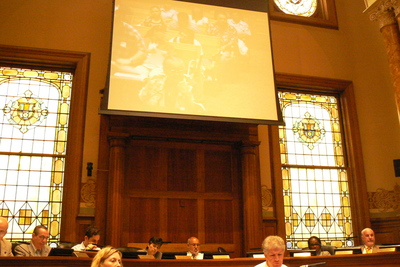Facing an estimated $42 million dollar deficit, Jersey City’s municipal budget is very much on the minds of local officials.
The fiscal year began this past July 1 and runs until June 30, 2010. Usually, officials in the city’s financial office start doing a draft budget early in the fiscal year to get a general idea of how much revenue the city has to collect to meet operating expenses and other obligations. But in Jersey City, it is often months into the fiscal year before a budget is introduced and approved, because local officials must wait for state grants and local revenues to be received to shore up any shortfall.
The 2008-2009 fiscal year’s $474 million municipal budget wasn’t passed until May, because the city had to wait for state legislation to be passed allowing municipalities to defer 50 percent of their pension payments to the state for the fiscal year. That allowed Jersey City to defer $14.8 million in spending into future years, but the deferred contributions now must be paid over the next 15 years starting next year at 8.25 percent interest.
Your taxes
Earlier this month, the City Council voted at a special meeting for a preliminary municipal tax levy of $170 million, and property tax bills will be sent to residents for the third and fourth quarter of this calendar year before the 2009-2010 fiscal year budget can be struck.
Business Administrator Brian O’Reilly explained at that meeting that the increase of the tax levy was also to get more “cash flow” into the city’s coffers to start the new fiscal year, as there is a projected $42 million structural deficit.
Jersey City employees are being asked to take voluntary furloughs.
________
The city’s chief financial officer, Donna Mauer, said recently that there has been a “very positive” response from employees about the voluntary furlough program, but she could not offer the number of employees who have agreed.
It’s all about savings
If discussion at the July 15 council meeting was any indication, council members have already started focusing on the budget.
The council voted at that meeting to approve a $50,000 contract with Seattle lawyer Charles Montange, who has been providing legal counsel to the city about a development controversy involving the Sixth Street Embankment, the historic group of sandstone and granite walls spanning Sixth Street downtown from Marin Boulevard to Brunswick Street.
Council members Peter Brennan and Bill Gaughan, who both voted against the contract, said they wanted the Embankment issue to be settled rather than to continue spending money on litigation contesting the current ownership of the Embankment. Both of them said the city was facing a tough fiscal year as one of their reasons for preferring a settlement.
President Mariano Vega said after that council meeting the city will be facing difficulties with their budget for 2009-2010, and will not be allowed to defer pension payments to the state again like they did in the previous fiscal year. He said there will be hard decisions to make when it comes to cutting the budget.
“We would have to cut five to 10 percent out of our budget, which does not cover public safety,” Vega said. “And only a small portion of city services is covered, so that would be what, cutting 10 percent of 25 percent, since about three-quarters of our budget is for police and fire.”
Ricardo Kaulessar can be reached at rkaulessar@hudsonrreporter.com.
